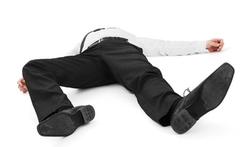Fainting is usually harmless. It is usually the result of a blood pressure drop that your body repairs on its own. However, it is serious, if there is an underlying condition at the root. The most common causes are described here.
- Dehydration
- If you don't drink enough or if you lose too much fluid, there is a chance that you will dehydrate or dry out. Your nervous system cannot control your blood pressure properly, so a blood pressure drop can occur. Therefore, keep an eye on your pee. If it is not clear, it is wise to drink a little more.
- Low blood sugar levels
- Low blood sugar or hypoglycemia can make you dizzy, shaky, tired and confused and cloud your vision. Usually you can solve this problem if you get a few grams of carbohydrates from juice or sweets. If you don't, you may pass out.
- Diabetes
- High blood sugar levels due to diabetes can damage the nerves in your body that help to maintain your blood pressure. That can lead to an unusually low blood pressure, causing you to pass out.
- Medication
- Sometimes fainting is a side effect of medication. Medications for high blood pressure and antidepressants, for example, affect the way your heart and blood vessels react when you stand up. Insulin - which is used to lower blood sugar when you have diabetes - can also cause fainting.
- Stroke
- In the event of a stroke, the normal blood supply of the brain is disturbed. Symptoms include: eyes rolling backwards, jerky movements and you can be unconscious for minutes. You can also lose control of your bladder, see flashes of light or experience unusual smells or tastes without a clear cause. Contact your doctor if you suspect a stroke.
- Standing up
- If you pass out when standing up, you may suffer from a condition called postural orthostatic tachycardia syndrome (POTS). Then your pulse increases too much when you get up or sit down. As a result, you may feel sick or dizzy. You can also start shaking or sweating, your heart can skip a stroke, and you may pass out. It can help to drink a lot, limit caffeine and alcohol and stand up more slowly. Your doctor may prescribe medication to treat the condition.
- Heart problems
- Damaged heart muscles, blocked or narrowed blood vessels and other problems with the heart muscle can prevent enough oxygen-rich blood from flowing to the brain, which can cause you to pass out. This can happen very suddenly, sometimes repeatedly over a period of weeks. If you suspect a heart condition, contact your doctor right away. Even if you have other symptoms such as chest pain, cardiac arrhythmias or fatigue.
- Vasovagal syncope
- With vasovagal syncope, your body overre reacts to the sight of blood, sudden intense emotion, fear of injury, or anything else that shocks you. Your heart rate slows down as the blood vessels dilate and the blood collects in your legs, away from your brain. Just before it happens, you may suffer from cold, clammyness, palsiness and nausea. If you feel like you can pass out, lie down and lift your legs.
- Hyperventilation
- If you hyperventilt, you feel like you're not getting enough air, so you start breathing faster. Although it is unclear why, this causes the blood vessels around your brain to shrink, causing you to get less oxygen, become light-headed and possibly faint. Anxiety is usually the cause and not so much a physical problem.
- Drinking alcohol
- Drinking alcohol causes your blood vessels to expand, which can lead to a drop in your blood pressure. You can pass out if you drink so much that you reach a dangerously high blood alcohol level.




